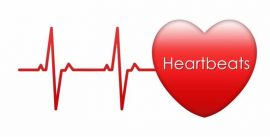By Cory Robertson, PT, DPT, Therapy Resource
 According to a study out of the University of California, San Diego, the answer is no, and yes. How can that be, you ask? Keep reading to get the details and the findings of the study: A pilot randomized study of gratitude journaling intervention on HRV and inflammatory biomarkers in Stage B heart failure patients.
According to a study out of the University of California, San Diego, the answer is no, and yes. How can that be, you ask? Keep reading to get the details and the findings of the study: A pilot randomized study of gratitude journaling intervention on HRV and inflammatory biomarkers in Stage B heart failure patients.
Patients with Stage B heart failure are those who have a structural abnormality of the heart but have not yet developed symptoms. Thus this stage is a therapeutic window of opportunity to deliver interventions to prevent the progression of the disease and to maintain quality of life.
Studies suggest a strong connection between gratitude and well-being. The area of behavioral cardiology is increasing focus on positive psychology like gratitude and how it affects physical health. More studies are needed using objective measures of physical health to understand the disease-buffering effects of gratitude. One of those objective measures studied in this paper is heart rate variability (HRV). As we know, HRV is a measure to quantitatively assess variation in heartbeat intervals that is often used to detect changes in the autonomic nervous system. Psychological factors like mood, satisfaction, depression and chronic stress are related to the autonomic nervous system, suggests the research. So can gratitude journaling improve HRV?
Seventy patients with Stage B HF were randomized into two groups: a gratitude journaling group, and a “treatment as usual” group for a period of eight weeks. Participants were assessed at pre-, mid- and post-intervention for inflammatory biomarkers from a blood draw, basal HRV data obtained, as well given a gratitude and exercise activities questionnaire.
After eight weeks, these data were re-acquired; also, both groups were assessed for HRV responses to a specific gratitude journaling task. Here is the wording of the journaling instructions, and if you’re like me, just reading the instructions summons a sense of well-being: “For the next eight weeks, you will be asked to record three to five things for which you are grateful on a daily basis. Think back over your day and include anything, however small or great, that was a source of gratitude that day. Make the list personal and try to think of different things each day.”
Basal HRV measures between groups after eight weeks showed no significant differences — though at the eight-week assessment during the specific journaling task, there were medium to large effect sizes between the groups’ HRV. So assessing the different groups’ HRV separate from the act of gratitude showed no difference, but during a gratitude task, there was a significant difference. The authors surmise that “increases in parasympathetic cardiac tone … [during] journaling may reflect state changes that occur while contemplating items or feelings of gratitude during daily life.” Moreover, the gratitude journaling group had a significant reduction in inflammatory biomarkers, which are related to morbidity and mortality in patients with HF.
I’m grateful for this research and for the opportunities to learn more about the heart and how I can do something to help my heart function. Do you think reading research regarding gratitude and its benefits also improves HRV?

